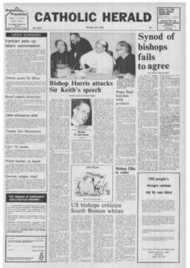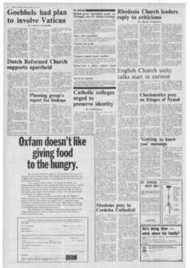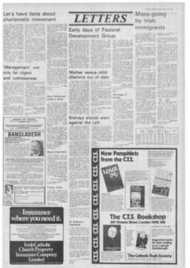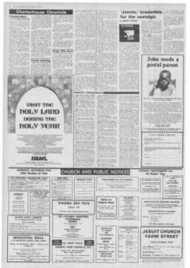Page 6, 25th October 1974
Page 6

Report an error
Noticed an error on this page?If you've noticed an error in this article please click here to report it.
Tags
Share
Related articles
Films By Freda Bruce Lockhart
Films By Freda Bruce Lockhart
'a Man For All Seasons'
A Joyous Classic
Studies In Eccentricity
A saint,a Nazi fugitive and a multitude of ants
by FREDA BRUCE LOCKHART
A week or two ago I took an advance opportunity to herald the imminent re-release of A Man for all Seasons ("U," Columbia). Now here it is in Shaftesbury Avenue, Fred Zinnemann's masterly film of Robert Bolt's great play about St Thomas More, the Chancellor of England who went to the block for the steadiness of his Catholic faith.
The story of More's martyrdoin is as inspiring and as heartrending as 400 years ago Paul Scofield's performance as live with English humour and balanced with sweet reason, and Zinnemann's film as beautifully articulated as they wcre when the film was new years ago.
For all who have not seen it, "A Man for All Seasons" is still the finest film in town, only possibly to be rivalled for special cases and occasions, by "That's Entertainment." All who care to go more deeply into the background of More's martyrdom will surely find abundant illumination on the religious malaises of today. How rewarding, too, for playwrights to choose saints as welldocumented as St Thomas More or St Joan of Arc who left 'such magnificent authentic dialogue.
Frederick Forsythe's novel "Day of the Jackal" furnished material for another fine film by Fred Zinnemann. Forsyth's latest movie, The Odessa File ("A," Odeon, Leicester Square) is directed by Ronald Neame, anotner very polishea director.
Neame has the benefit of that superb British cameraman Oswald Morris, doing such ravishing things pictorially that his journey through the German landscape is almost more exciting than the action of Jon Voight's attempt to track down Maxmilian Schell as the former commandant of a concentration camp.
As with "The Day of the Jackal," the approach is what we used to call semi or pseudodocumentary. An important difference, however, is the subject. Dominating at least the long climax of "Day of the Jackal" was not indeed a canonised saint, like Thomas More, but the very towering personality of President Charles De Gaulle.
In "The Odessa File" we are up against only the largely anonymous (forgetting and excepting Hitler) collective guilt d Uermans for the crime against the Jews. The blond, roundfaced Mr Voight is recruited and persuaded by high-up Israelis to set out in pursuit. of one less anonymous war criminal known as "The Butcher of Riga."
The chase takes him and us pretty well over Germany, from Hamburg to Munich, to Vienna and back again. We find an occasional peripheral victim or his family, two fleeting glimpses of the butcher (Maxmilian Schell), a frustrating impression of a protective network or league of non-gentlemen guarding each other's secrets which makes the protection racket a closed shop indeed. But very few of the characters achieve any personal interest.
There are a couple of female characters, although I shared the irritation expressed by one of them with this almost entirely masculine society, Maria Schell no relation, I believe, of Maximilian, but always a touching actress, who may be remembered for "The Heart of the Matter" has a few mov ing moments, as the mother and widow of Nazis, who lives in fear of further bereavement. Mary
Tamm is interesting as Voight's girl-friend, forced to share a flat under the watchful eye of a planted girl-spy.
The dissatisfaction into which my first admiration for the film waned may be due to simple disappointing at finding Maximilian Schell, one of the most attractive of German actors, playing a boring villain.
In general this AngloGerman enterprise makes an honourable effort to tackle matters of mutual interest, Most of the actors are Germans playing in a foreign language (English) or German-American Mr Voight speaking Anglo Saxon with a slight German accent, which means all of them are hampered.
But Morris's photography or lake and forest, town and train,
is superb; Neame's direction fluency itself, and it all moves smoothly and quickly enough to pass the time quite effectively. Despite my middle name, insects even spiders are my least favourite fellow-creatures.
Bees are all very well, and the honey's worth the sting. Even of wasps I urn not much more afraid than of the oeople who flap napkins or newspapers at them. But spiders! and scorpions and ANTS pace Mr Maeterlinck, Phase IV ("A," Paramount) is
about ants. Or rather it is about two biologists Nigel Davenport and Michael Murphy who set up tent in the Arizona desert, with elaborate electronic equipment for observing ants and (as far as I could follow) measuring whether the ant population would explode quicker than the human.
1 found it both itchy and unpleasant, though certainly not uninteresting. A kindly-couple are understandably enough frightened to death by the multiplying ants ("imagine such helpless individuals, so powerful in the mass" comments one of the biologists fondly as he watches his workers unite).
I couldn't understand whether the granddaughter's horse had to be shot to save it from the worse fate of being devoured by ants, or whether it was to be so devoured. Very nasty anyway, and I only hope it is science-fiction and nothing to do with fact.
blog comments powered by Disqus









